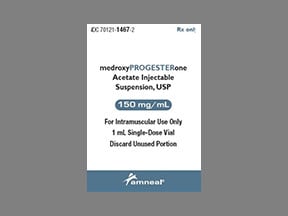Depo-provera is a limited distribution medication.

Depo-provera Coupons & Savings Card – Discount Prices from $35.50
Brand for: Medroxyprogesterone
My prescription
Edit
1ML of 150MG/ML, Medroxyprogesterone (1 Vial)
Select pharmacy

CVS
$35.72
COUPON PRICE
Albertsons
$35.50
COUPON PRICE
Walmart
$36.37
COUPON PRICE
Walgreens
$38.89
COUPON PRICEDepo-provera savings card
Show this card to your pharmacist
Albertsons
$35.50
BIN
ID
PCN
GRP
019876
LH7996AE77
CHIPPO
LHX
Powered by
Related progestins prescriptions
More prescriptions for renal cancer
Related progestins prescriptions
More prescriptions for renal cancer
Price history for Depo-provera (brand) & Medroxyprogesterone (generic)
1 Vial, 1ML of 150MG/ML
Average retail price for Depo-provera
Average retail price for Medroxyprogesterone
Average SaveHealth price for Medroxyprogesterone
Our price history data is based on aggregated prescription data collected from participating pharmacies in America. Our prescription data updates daily to reflect the latest price changes. If you notice a missing data point, it means there wasn't sufficient data available to generate a monetary value for that date.
Over the last 12 months, the average discount price of Depo-provera is $33.24 using the SaveHealth savings card. That's an average savings of 83.91% on Depo-provera with our discount card.
*Retail prices are based on pharmacy claims data, and may not be accurate when we don't have enough claims.
Depo-provera (Medroxyprogesterone) dosage forms
Dosage Quantity Price from Per unit 1ML of 150MG/ML 1 Vial $35.50 $35.50 1ML of 150MG/ML 2 Vials $45.14 $22.57 1ML of 150MG/ML 3 Vials $54.55 $18.18
| Dosage | Quantity | Price from | Per unit |
|---|---|---|---|
| 1ML of 150MG/ML | 1 Vial | $35.50 | $35.50 |
| 1ML of 150MG/ML | 2 Vials | $45.14 | $22.57 |
| 1ML of 150MG/ML | 3 Vials | $54.55 | $18.18 |
What is a bad side effect of Depo?
A notable side effect of Depo-Provera (medroxyprogesterone acetate) is a potential decrease in bone mineral density, which can increase the risk of osteoporosis and fractures over time. Other side effects may include weight gain, changes in menstrual cycles, and mood changes. It is important for individuals to discuss these potential risks with their healthcare provider.
What are the signs of Depo wearing off?
The signs of Depo-Provera wearing off can include the return of menstrual periods, which may initially be irregular. Some individuals might experience symptoms such as changes in mood, weight fluctuations, or a return of premenstrual symptoms. Fertility may gradually return, but it can take some time for ovulation to resume. If there are concerns about specific symptoms or the timing of fertility return, consulting a healthcare provider is recommended.
Does Depo cause belly fat?
Depo-Provera, a form of birth control, can lead to weight gain in some individuals, which may include an increase in belly fat. However, weight changes can vary from person to person, and not everyone will experience this side effect. It's important to discuss any concerns about weight gain with a healthcare provider, who can provide personalized advice and guidance.
What are the disadvantages of a depo shot?
The disadvantages of the Depo-Provera shot, a form of birth control, may include the following:1. Irregular Menstrual Bleeding: Users may experience changes in their menstrual cycle, including irregular bleeding or spotting, especially in the first few months.2. Weight Gain: Some individuals may experience weight gain while using the Depo shot.3. Bone Density Loss: Long-term use can lead to a decrease in bone mineral density, which may increase the risk of osteoporosis.4. Delayed Fertility Return: After stopping the shot, it may take some time for fertility to return to normal, sometimes up to 10 months or more.5. Mood Changes: Some users report mood swings or depression.6. Other Side Effects: These can include headaches, breast tenderness, and changes in libido.It is important for individuals to discuss these potential disadvantages with their healthcare provider to determine if the Depo shot is the right contraceptive method for them.
Is the depo shot good for your body?
The Depo-Provera shot, a form of birth control, is generally considered safe and effective for many individuals. However, like any medication, it may have side effects and risks. Some people may experience changes in menstrual cycles, weight gain, or decreased bone density with long-term use. It is important for individuals to discuss their medical history and any concerns with their healthcare provider to determine if the Depo shot is a suitable option for them.
